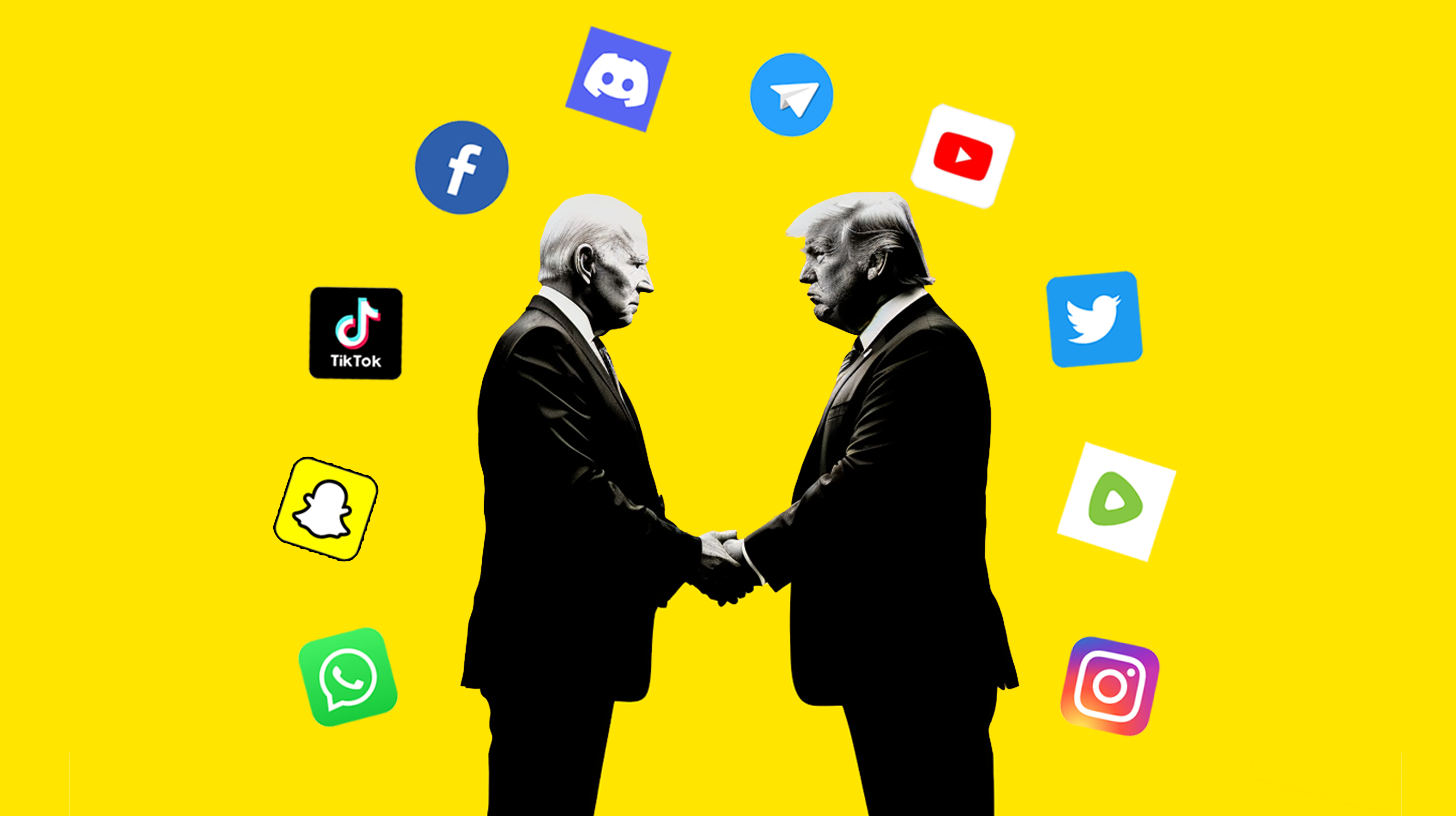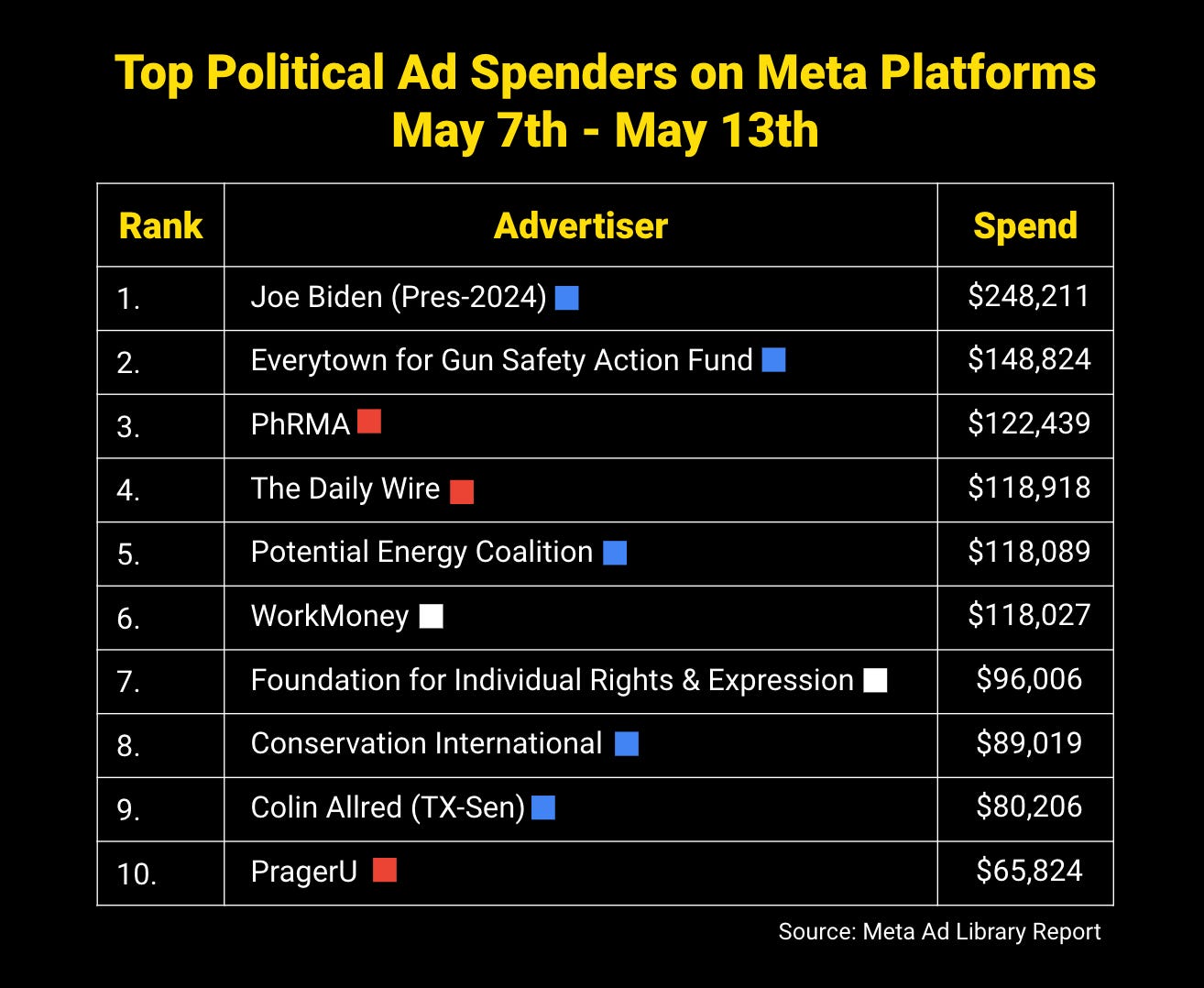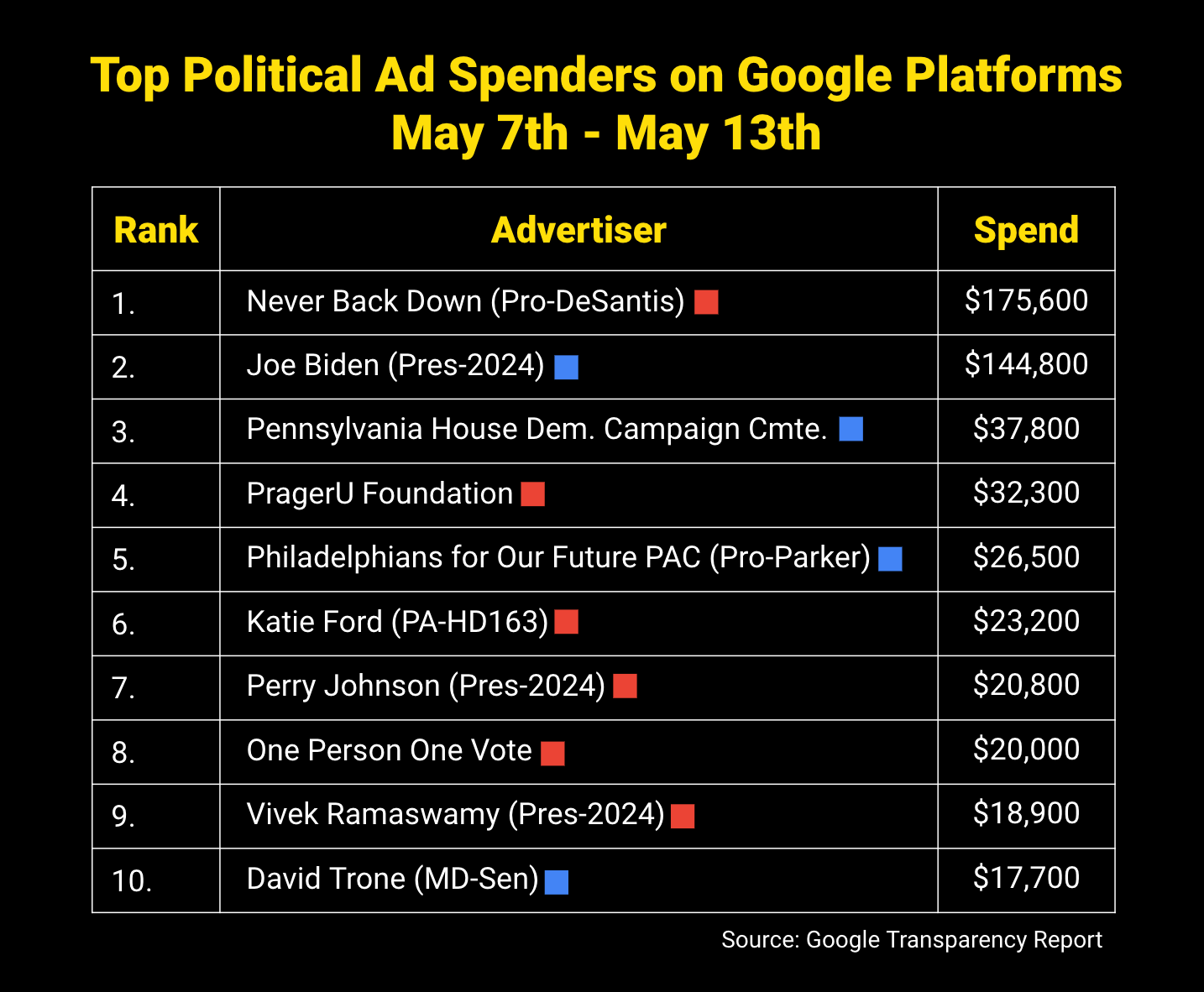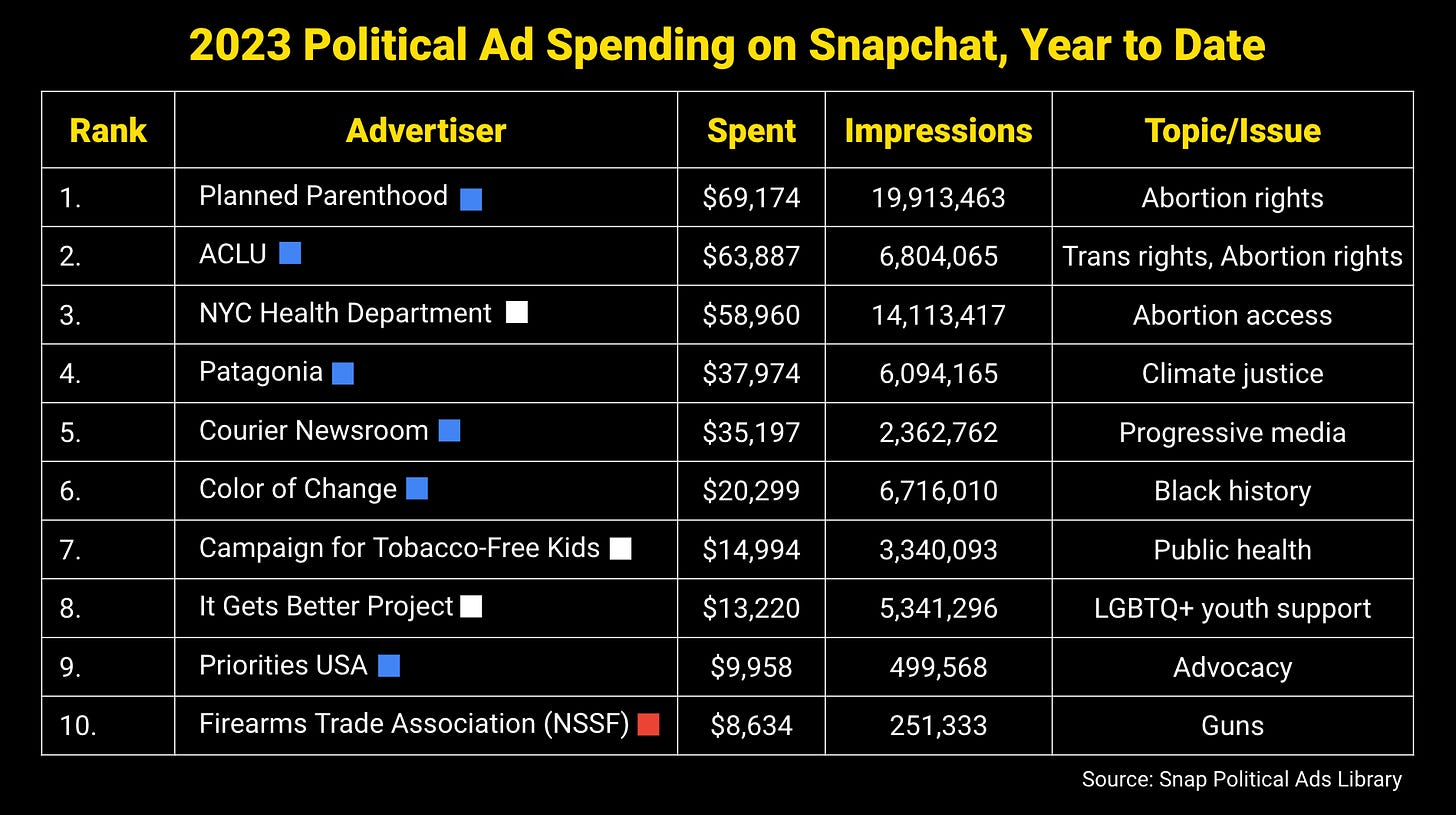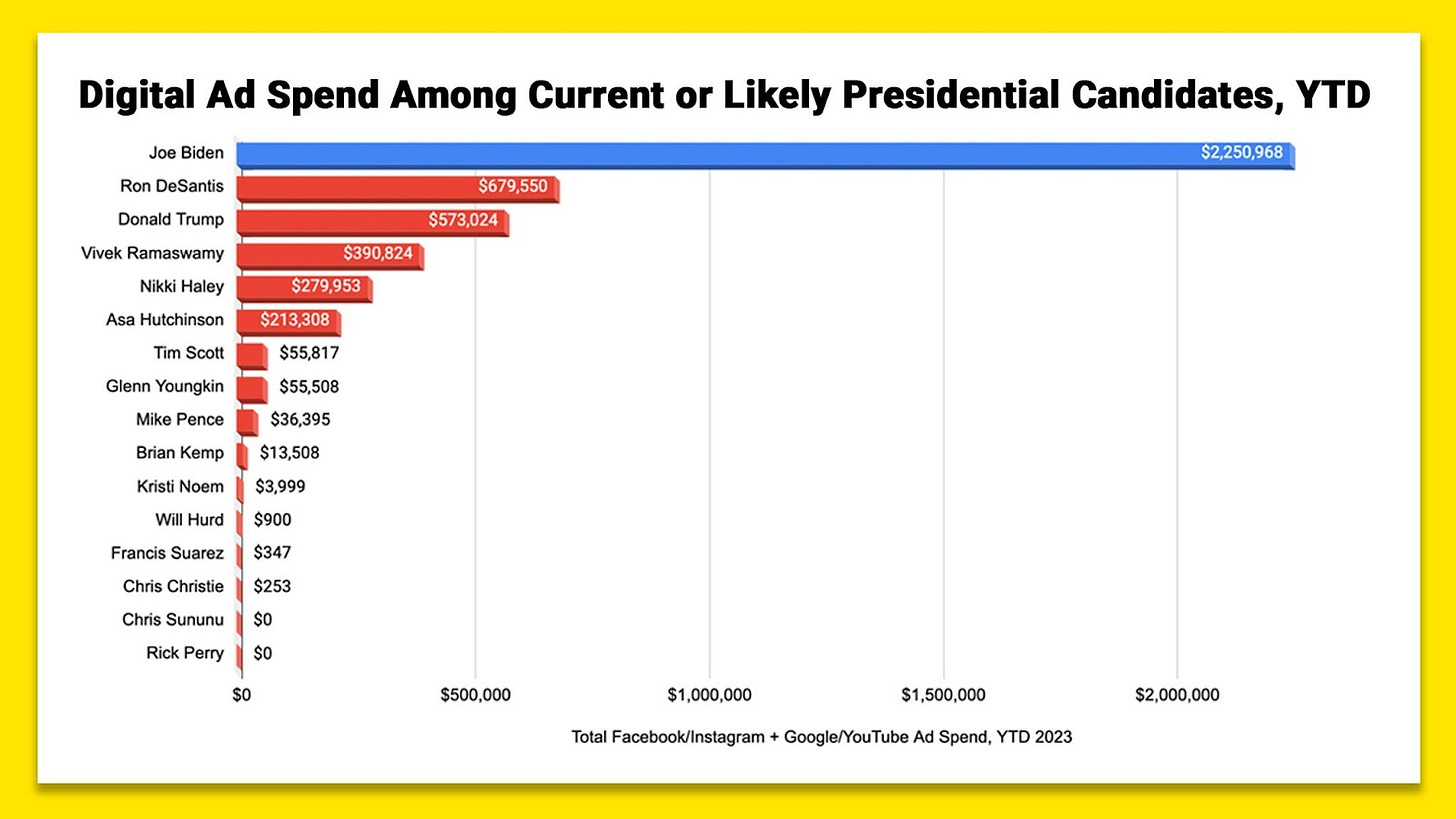How big tech platforms will (or won’t) tackle the 2024 campaign
A conversation with Katie Harbath on big tech’s big role in next year’s elections
Historically, large tech companies (like Google, Facebook, and Twitter) have made major investments in people and policies to provide transparency into what content is spreading on their platforms, to take down harmful or false information, and to provide labels and trusted information about elections. Now, it seems like the major platforms are beginning to pull back from some of those investments, at precisely the same time that Americans’ eyeballs are moving to emerging platforms with fewer safeguards.
For this week’s FWIW, I spoke with Katie Harbath - a leading voice in the tech policy space - on a range of issues from Facebook’s deprioritization of political content, to Twitter’s downfall and the rise of AI tools. You can watch or read the full conversation below. But first…
By the numbers
FWIW, political advertisers spent just over $7.85 million on Facebook and Instagram ads last week. These were the top ten spenders nationwide:
For the third week in a row, the Biden campaign was the top-spending political advertiser nationwide on Facebook and Instagram ads. That could soon change, with a host of other candidates set to announce their campaigns in the coming weeks.
Senate Majority PAC, through an affiliate, has now spent over $65,000 on Facebook and Google ads supporting Sen. Joe Manchin in the past month. The pro-Manchin campaign comes as DC Democrats try to persuade the red-state centrist to run for re-election instead of a third-party presidential run. Read more + see the ads here >>
Asa-mentum? A source told FWIW this week that America Strong & Free Action plans to ramp up its digital ad spending significantly in support of former AR Gov. Asa Hutchinson’s presidential bid.
Meanwhile, political advertisers spent $1.16 million on Google and YouTube ads last week. Here were the top ten spenders nationwide:
Ron DeSantis’ Super PAC, Never Back Down, was the top spending political advertiser across Google and YouTube last week. The PAC is running positive biographical videos on YouTube and some Google Search ads for fundraising. DeSantis is expected to announce his presidential campaign next week.
A lot of Google ad spending took place in Pennsylvania last week, where a host of Democratic candidates and PACs spent big in Philly’s mayoral election. Democrats also won a special election for state House District 163, maintaining their narrow majority in the state legislature.
Political advertisers in the United States have spent $713,000 on Snapchat advertising in 2023. Here are the top ten spenders YTD:
From around the internet
The state of Montana completely banned TikTok, becoming the first state to do so.
Democratic data firm Catalist released its new “What Happened” report packed with data on the 2022 midterm elections. It’s a must-read >>
Some Democrats are building an AI tool to optimize campaign fundraising. It’s backed by progressive tech incubator Higher Ground Labs.
2024 dispatch
FWIW, here’s how much money likely or confirmed 2024 presidential candidates have spent on Facebook + Google ads to date (1/1 - 5/13):
A note: this tracking has been updated (1) to include new candidates who are considering running, and (2) DeSantis’ spending number now includes dollars spent from Never Back Down, a key allied Super PAC. This cycle, Republican campaigns are leaning more on outside groups to take on traditional campaign responsibilities, and it’s important to capture that.
How big tech platforms will (or won’t) tackle the 2024 campaign
I’ve written before about my worries related to social media transparency and content moderation in next year’s presidential race. Historically, large tech companies (like Google, Facebook, and Twitter) have made major investments in people and policies to provide transparency into what content is spreading on their platforms, to take down harmful or false information, and to provide labels and trusted information about elections. Now, it seems like the major platforms are beginning to pull back from those investments, at precisely the same time that Americans’ eyeballs are moving to emerging platforms with fewer safeguards.
I reached out to Katie Harbath, a leading voice at the intersection of tech policy and politics, to hear her thoughts on how this dynamic is unfolding. Harbath has a long resume in the space - from leading public policy decision-making at Facebook for a decade, to a past history working with Republican campaigns. She now is a member of the Integrity Institute and helps organizations and companies think about how to approach these issues. You can watch the full conversation on YouTube, or continue reading for the transcript:
The below transcript has been edited for clarity.
Kyle Tharp: In the past few years, it seems like big tech companies’ investments in things like content moderation, transparency, and election integrity have decreased or faded into the background. You have a ton of history in the space, particularly doing tech and elections work at Facebook during a sort of “golden age” of transparency efforts. For starters, what’s your 20,000-foot take on particularly how Facebook's investment in things like content moderation and transparency has changed from 2020 to 2024?
Katie Harbath: If you'll allow me, I think it is actually worth going further back. I was at Facebook for 10 years and before that, spent 8 years in Republican digital politics - my first election was 2004, when we weren't even using Facebook, Twitter didn't exist, and Youtube didn't exist… There were like 15 years where everybody thought these digital platforms were going to be this great democratizer. There was the Arab Spring in 2011, and everyone in politics and tech sort of had a goal of getting the President of the United States to engage with people using these online tools.
Then came 2016. You also had the Philippines Election, Brexit, and the “trending topics” controversy for Facebook, and that's when you started to see not just Facebook but also Google and Twitter start to build up these specific teams around election integrity and just platform integrity overall.
That included the political and issue ad transparency tools - libraries where you could see the ads that were run, how much money was spent, the number of impressions they had, etc - as well as a lot of stuff around mis and disinformation. At its peak, at Facebook, we had about 40+ teams, 500 full-time employees, and I think it was around 30,000 contractors that were working on things that were elections-related. 2020 was probably the peak in terms of a presidential-level election. It was all hands on deck for the company. We created these voter information centers, you saw policy changes happen around voter suppression and things of that nature, and you saw a lot of content get labeled, explaining to people about mail-in ballots etc.
Now, you have layoffs in the industry impacting some of the employees that have been working on these issues. Twitter's been massively impacted on that front, and with Facebook it's still a little hard to know exactly how much those teams will be impacted. There's another round of Facebook layoffs coming which will be the third and final round for this year - and there are a lot of questions about how much that will impact Facebook's work (around elections).
I definitely think we might be seeing some pulling back from Meta/Facebook, but I don't think we know fully what that will look like yet and I also don't know if that's necessarily a bad thing. We shouldn't assume that because there's a lot of work that has to go into building these tools and then there becomes a point where it's actually less work to just do maintenance than having to build them.
As I said, I could talk about that forever, but I think that gets us to where we are today!
Kyle Tharp: That's a great summary. Meta/Facebook has made a pivot away from the social feed into the quote-unquote metaverse, and what that means for campaigns and how they use the company’s platforms is really different. I've reported on how I've seen a kind of a decline in user engagement on posts about politics - and how the platform seems to have deprioritized political content across the board.
It’s been really interesting to see as I'm starting to track how campaigns themselves are using Facebook this election cycle.
Katie Harbath: Facebook has reduced the amount of political content because they say that that's what people don't want as much of in their feeds.
The reality is going to be that especially as you come into a presidential cycle, the amount that people are talking about politics will continue to go up. The company frankly said and did the same thing in 2017 after 2016 cycle - there was a newsfeed change. Now, this last one was a little bit stronger on the political content side, but we should not fool ourselves into thinking that (political content) is going to go away. What it looks like today is not going to be what it looks like next year. That’s all to say I think a lot of campaigns are still finding Facebook helpful for getting email addresses and fundraising and that seems to be the primary way that they’re still using it.
Kyle Tharp: Like Donald Trump…
Katie Harbath: I said from the beginning that once Donald Trump got let back on, I thought Facebook was going to be the first place he would post because he would want to run ads. And as you now can see, he's been posting on Facebook and Youtube - and not Twitter, which I find interesting. I think that Twitter was always his place to sway the news media and try to get their attention whereas Facebook was always where he would catch regular voters.
We definitely saw in the midterms that campaigns were moving a lot of their spending to places like streaming or other places that don't have these ad transparency tools like Facebook, and I won't lie… it kind of drives me nuts after being the person that was sort of a punching bag at Facebook for all of our decisions. It is totally fair, but to now see there is little to no talk of the fact that we don't know what ads are being run on Hulu, we don't know how they're targeting people on OTT, on cable boxes, we don't know what the podcast advertising system looks like for politics, we don't have transparency things built in for influencer partnerships and others.
Kyle Tharp: That’s a good segway to discuss TikTok, which explicitly bans political ads and supposedly bans fundraising asks in content. As a result, there have been all these third-party firms pop up to create paid influencer partnerships between campaigns and influencers (which is also technically against TikTok’s policies). Putting aside all of the other concerns with TikTok, we'll have no idea who is being paid for political speech and how much of it is just organic political content, which seems like a mess.
Katie Harbath: I always say that these platforms can run from politics, but they can't hide. Even in saying that you're going to ban political ads, you still have to define what that is - which is in and of itself a political act.
Then there’s the question of how they're actually enforcing their policies. There was an expectation on us at Facebook that we would proactively find political and issue ads and not allow them to run unless they went through the process that we had. I have not seen details from TikTok to know if they're doing any of that proactive work on this. These tools are not foolproof in trying to actually stop this stuff.
To your point about influencers…It's hard for the platform to know if this is just somebody who's excited and loves the candidate and wants to say please go vote for them or if there was money handed to them to actually say that. How do we make sure that we know whether or not these folks are being paid or not by the campaigns? I frankly would like to see the FEC putting out some more rulemaking on this. It’s going to be a huge challenge and another arrow in this quiver of people questioning the truth of what they're seeing online.
Kyle Tharp: When you mention the FEC doing something, it kind of gives me heartburn because this Spring they put out some new guidance for digital political ads. It was something like requiring a big disclaimer on your digital political ads…but what if a campaign is paying to promote a news article in someone’s feed? There’s nowhere to put a disclaimer. What if you have an influencer that is just saying something on their TikTok - there’s really nowhere to put a disclaimer there either. The FEC seems a little oblivious to what digital political ads even are.
Katie Harbath: To your point again about the internet being the Wild West - I again feel like we're building the plane as it's taking off. We can't stop these Election Days from coming, and we can't stop new technology from being created - you just have to learn how to adapt even faster.
Kyle Tharp: So we’ve mentioned TikTok and Facebook as two of the platforms that I think will have a huge impact next year. Obviously, Twitter is a whole thing right now. Maybe it won’t even be around next year. Like Facebook, Twitter has a very long history of engaging with the political space and with content moderation. Most people don’t even remember that they had a political ad library back in 2018 before they banned political ads and now reallow them. I’m curious for your thoughts about Twitter’s changes in terms of no longer having actual bodies thinking about these issues we’re talking about.
Katie Harbath: Twitter has shifted from a place where I oftentimes communicated with journalists, academics, and politicos, and I learned from things that different people were putting out. You had really interesting conversations. Twitter Spaces was fantastic for the brief period where people used it. Now, the conversation is just everyone being exasperated about what the next thing Elon Musk is going to do. It's very similar to the pull that Donald Trump has over people - where he opens his mouth and people pay attention. I think here’s where Twitter is going to be interesting: Right now, Republicans in the House and Republicans overall think Elon Musk is their friend. I think that is a mistake.
While Musk says that he is for free speech, there's been a lot of contradictory things that he has done in terms of complying with government requests and taking things down. I think Musk is in for a world of hurt, although he's probably going to shove it to the new CEO to have to deal with. That’s because most of these technologists don't want to have to deal with these tough societal questions that come up in front of them.
Twitter was always less staffed than some of the other big tech companies in the elections space, and now even more so. What that tends to mean is that bad actors look for the places that have less enforcement and that are less likely to actually take action on them. My concern is that people are gonna see that no one is guarding the front door anymore at Twitter.
Kyle Tharp: From my own experience I know that campaigns and outside groups are very aware of things like reporters seeing their ads in a transparency database or something. It makes sense in that Twitter context, and you mentioned several other platforms. What other sites and platforms are you keeping an eye on for their impact on politics next year?
Katie Harbath: Discord, Twitch, Substack, and all of those federated Twitter clones. I'm definitely keeping a close eye on (conservative video site) Rumble. I feel like it was underreported that Rumble is going to be a partner for the first Republican presidential debate in August in Milwaukee. For me, that was an interesting bookend because Facebook was the partner with FOX News for the first Republican debate in 2015. Now, nine years later, it’s going to be Rumble - this far-right video site that’s based in Canada that paid Donald Trump Jr millions of dollars earlier this year.
Kyle Tharp: I heard about the Rumble thing just last week. It’s wild.
Katie Harbath: And then I’m definitely watching all of these AI tools. They’ll be used in very interesting ways. Google announced last week at their conference this thing called Tailwind where you can take your own documents and it'll train an AI classifier just on your own material. Imagine if you take every utterance that a candidate has ever said and you use that to help write an email in their voice, to A/B test ad copy, your social media posts. If you’re working on a downballot race and you’re one comms person who has to crank out a bunch of material, it could really help your job.
Obviously, it’s right to be concerned about the various ways these tools can be used for deep fakes - whether that's images, audio, or video. I'm most worried about audio because you have the least amount of context to figure out if its real or not. But the thing to remember too is that while these tools can be used to create these things, they can also be used to detect them.
Google already announced a tool to detect if an AI image has been modified, OpenAI has something for text… I just think that if you and I got together this time next year, there are going to be so many new tools that candidates are using - let alone what it's going to look like in November 2024. So, when I'm talking to campaigns and others, the only thing I can tell them is that you've got to make sure you have a very flexible and adaptable online strategy and digital budget that can be moved quickly from one thing to another. I will bet you money that there is going to be a platform that is going to have an impact on the election that is not yet created or is still just being created in somebody’s garage right now.
Kyle Tharp: Oh for sure. For me, the speed of these platforms' growth has been wild. Just last year, AI images all kind of looked bad and corny. Now, with Midjourney, you can create a hyper-realistic image of Joe Biden doing whatever you want. We have a year and a half to go and that platform in particular only has loose guidelines of “don’t create anything that's inflammatory.” It will only take one very very bad international incident for them to finally put in some safeguards.
Katie Harbath: One of the other organizations that I'm a part of is the Integrity Institute. On Wednesday, we launched an Elections Integrity Best Practices Guide which is meant to be used by companies to think through all of these issues that we’re discussing. We’re really hoping that it can provide a good framework, not just for the big companies, but across the board.
We have a lot of members of the Integrity Institute that used to do this work at Twitter, Facebook, Google, and other places, and we're hoping that for some of these emerging and newer tech platforms, this will give them some tools so they don't have to start from scratch. Because I agree with you: It's only going to take one big incident.
Kyle Tharp: Any other topline thoughts on next year?
Katie Harbath: I think it's going to be a big roller coaster. You have the U.S. Presidential election in addition to elections in India, Indonesia, Ukraine, Taiwan, Mexico, the United Kingdom, and the European Parliament. In total, there are 65 elections across 54 countries. It is going to be so many fronts that these companies have to fight election integrity work - not just in the United States, but all around the world.
I just encourage people to remember that while we are still very early on in this process, things are happening now and we've got to be paying attention to them now.
Kyle Tharp: One last plug: you also write a newsletter called Anchor Change which is a must-read on the intersection of all of these issues around tech and politics. Thanks so much for joining the conversation!
That’s it for this week! This email was sent to 15,959 readers. Help FWIW reach more subscribers by forwarding this week’s issue to your colleagues! 🙏
Have a tip, idea, comment or question? Shoot me a reply and I promise to respond to every email.



